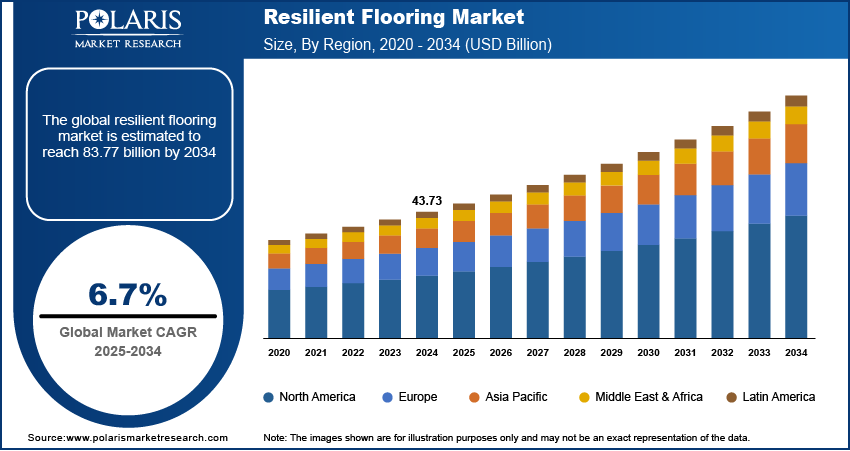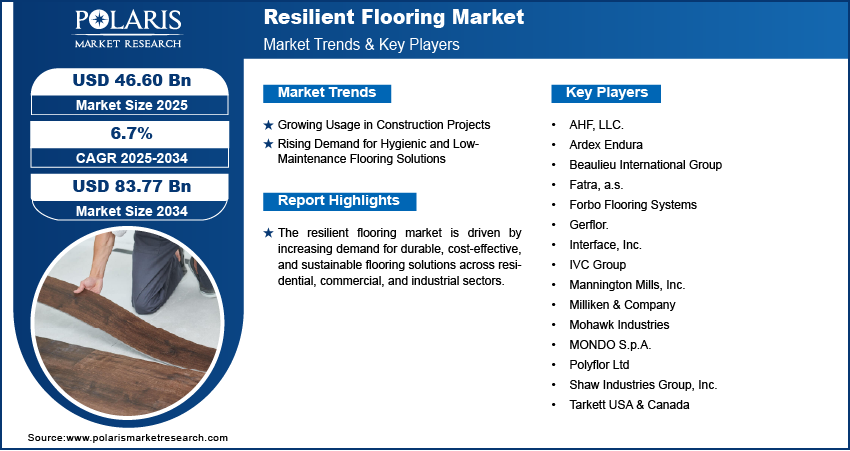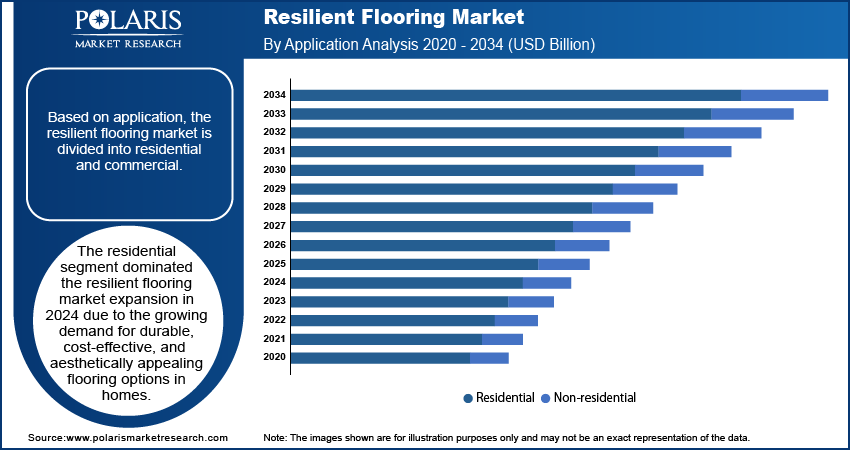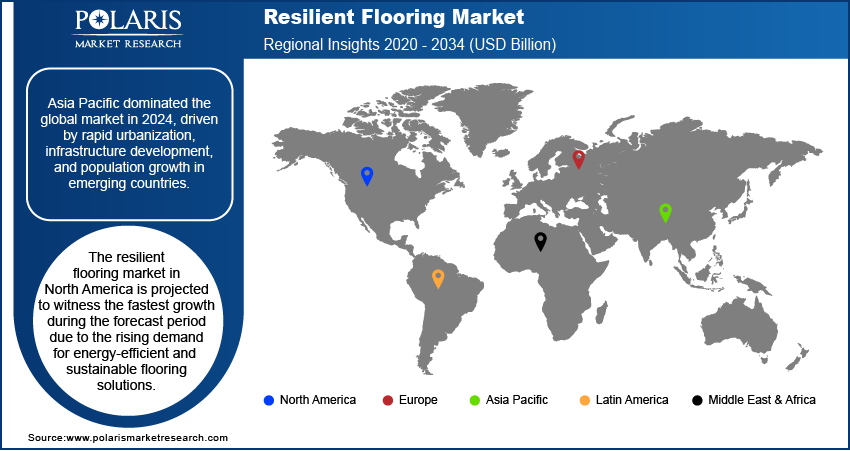
Resilient Flooring Market Size, Share, Trends, Industry Analysis Report: By Product, Application (Residential and Commercial), Distribution Channel, and Region (North America, Europe, Asia Pacific, Latin America, and Middle East & Africa) – Market Forecast, 2025–2034
- Published Date:Feb-2025
- Pages: 129
- Format: PDF
- Report ID: PM3287
- Base Year: 2024
- Historical Data: 2020-2023
Resilient Flooring Market Overview
The global resilient flooring market size was valued at USD 43.73 billion in 2024. The market is expected to grow from USD 46.60 billion in 2025 to USD 83.77 billion by 2034, exhibiting a CAGR of 6.7% from 2025 to 2034.
Resilient flooring refers to a versatile and durable flooring solution made from materials such as vinyl, linoleum, and rubber. The flooring is designed to withstand heavy foot traffic while offering comfort and ease of maintenance.
Increasing urbanization and rising awareness of sustainable building materials are a few of the key factors driving the resilient flooring market demand. Urbanization has expanded the development of residential, commercial, and industrial spaces, creating a need for cost-effective, durable, and aesthetically versatile flooring solutions. Additionally, the emphasis on sustainability in construction has boosted the adoption of eco-friendly resilient flooring options, such as those made from recycled materials or bio-based alternatives. For instance, in January 2025, Interface launched a carbon-negative nora rubber flooring prototype that stores more carbon than is emitted during its production. The introduction of the new prototype follows Interface’s commitment to invest in carbon reduction and storage without using offsets. These products align with green building practices and also cater to the rising consumer preference for environmentally responsible choices, making resilient flooring a key solution in modern construction.

To Understand More About this Research: Request a Free Sample Report
Consumers and developers are increasingly opting for flooring solutions that enhance insulation, driven by a growing focus on energy efficiency and thermal comfort in buildings. Resilient flooring, especially non-PVC, vinyl, and linoleum options, offers superior thermal and acoustic insulation properties, reducing energy consumption and noise levels in both residential and commercial spaces. For instance, in April 2024, Tarkett introduced a non-PVC resilient flooring collection that rivals luxury vinyl tile with superior dimensional stability, impact resistance, and maintenance ease. Additionally, the emphasis on indoor air quality has boosted the adoption of resilient flooring, as many products now comply with low volatile organic compound (VOC) emission standards, ensuring a healthier indoor environment. These attributes make resilient flooring an ideal choice for sustainable and energy-efficient construction projects, thereby driving the resilient flooring market expansion.
Resilient Flooring Market Dynamics
Growing Usage in Construction Projects
As urbanization accelerates and infrastructure development continues to expand, there is a growing need for flooring materials that can withstand heavy usage, offer design flexibility, and require minimal maintenance. Resilient flooring meets these demands by providing long-lasting performance, ease of installation, and a variety of designs and finishes suitable for modern architectural requirements. For instance, in July 2024, AHF Products introduced Ingenious Plank, a hybrid resilient flooring solution that sets a new standard in sustainability, performance, and design. Its ability to adapt to diverse environments and its cost efficiency make it a preferred choice among architects and developers. Thus, the growing usage of advanced flooring materials in construction projects is driving the resilient flooring market growth.
Rising Demand for Hygienic and Low-Maintenance Flooring Solutions
There is an increasing emphasis on flooring that can resist stains, inhibit microbial growth, and maintain cleanliness with minimal effort in sectors such as healthcare, education, and hospitality. For instance, a July 2024 report by the Centers for Disease Control and Prevention (CDC) stated that more than 2.8 million antimicrobial-resistant infections occur each year in the US, emphasizing the need for flooring solutions with antimicrobial properties to reduce health risks. Resilient flooring, particularly vinyl and rubber options, offers these benefits due to its smooth, non-porous surface, which prevents the accumulation of dirt and allergens. Additionally, its ease of cleaning and compatibility with disinfectants make it an ideal choice for spaces requiring high hygiene standards. The growing consumer preference for durable and hassle-free flooring materials that retain their appearance and functionality over time is further reinforcing the demand for resilient flooring across various applications.

Resilient Flooring Market Segment Insights
Resilient Flooring Market Assessment by Application Outlook
The global resilient flooring market segmentation, based on application, includes residential and commercial. The residential segment dominated the resilient flooring market in 2024 due to the growing demand for durable, cost-effective, and aesthetically appealing flooring options in homes. Homeowners are focusing on flooring materials that combines functionality with modern design due to rising urbanization and the growing trend of home renovations. Resilient flooring, particularly vinyl and linoleum, offers a wide range of designs that mimic natural materials such as wood and stone at a fraction of the cost, making it a popular choice among residential consumers. Additionally, its ease of maintenance, resistance to stains and water, and long-lasting performance make it ideal for high-traffic areas such as kitchens, bathrooms, and living spaces. These attributes, combined with the growing emphasis on creating comfortable and energy-efficient homes, have solidified the segment’s growth in the global market.
Resilient Flooring Market Evaluation by Product Outlook
The global resilient flooring market segmentation, based on product, includes luxury vinyl tiles, vinyl sheet & floor tile, linoleum, cork, and rubber. The vinyl sheet & floor tile segment is expected to witness the fastest growth during the forecast period primarily due to its affordability, versatility, and wide range of applications. Vinyl sheets and tiles offer superior durability and water resistance, making them ideal for both residential and commercial spaces prone to moisture exposure. Their easy installation and low maintenance requirements further enhance their appeal to homeowners and businesses. Moreover, advancements in design technology have allowed vinyl sheets and tiles to replicate high-end materials such as hardwood and ceramic tiles, catering to consumer preferences for stylish yet budget-friendly options. The segment's rapid growth is also fueled by its ability to provide a seamless appearance, excellent acoustic properties, and compatibility with modern sustainable building practices.

Resilient Flooring Market Regional Analysis
By region, the report provides the resilient flooring market insights into North America, Europe, Asia Pacific, Latin America, and the Middle East & Africa. Asia Pacific dominated the resilient flooring market revenue in 2024, driven by rapid urbanization, infrastructure development, and population growth in countries such as China, India, and Southeast Asian nations. The increasing construction of residential and commercial spaces in India, coupled with government initiatives to promote affordable housing, has significantly boosted the demand for resilient flooring in the region. For instance, in an October 2024 report, India’s Ministry of Commerce and Industry revealed that the Pradhan Mantri Awas Yojana-Urban has sanctioned over 12 million houses, with over 6.4 million successfully completed, aiming to provide all-weather housing to eligible urban beneficiaries. Additionally, the growing middle-class population with rising disposable income has led to a preference for durable, aesthetically pleasing, and low-maintenance flooring options. Local manufacturing capabilities and the availability of cost-effective products further contribute to the market expansion in Asia Pacific. The region's focus on sustainable construction and the adoption of eco-friendly flooring materials also aligns with the growing demand for resilient flooring solutions.

The North America resilient flooring market is projected to witness the fastest growth during the forecast period, driven by the increased demand for energy-efficient and sustainable flooring solutions. The regional market expansion is also fueled by the rising adoption of resilient flooring in residential renovations and commercial spaces such as offices, healthcare facilities, and educational institutions. Consumers in North America prioritize flooring materials that offer durability, ease of maintenance, and design versatility, making resilient flooring an ideal choice. Additionally, the emphasis on indoor air quality and compliance with stringent environmental regulations has spurred the adoption of low-VOC and recyclable resilient flooring options. For instance, in February 2024, the EPA finalized a rule to strengthen the National Ambient Air Quality Standards (NAAQS), reducing the annual PM2.5 standards from 12.0 to 9.0 µg/m³ to enhance public health protections against fine particulate matter exposure. Advancements in construction technologies and the growing popularity of luxury vinyl tiles (LVT) further contribute to resilient flooring market expansion in the region.
Resilient Flooring Market – Key Players and Competitive Insights
Major market players are investing heavily in research and development in order to expand their offerings, which will help the resilient flooring market grow even more. The market is highly competitive, with leading players focusing on innovation and strategic partnerships. Schneider Electric and Vertiv are leveraging sustainable technologies, while Huawei dominates with cost-effective modular solutions tailored for emerging markets. Collectively, these companies command significant market share through regional expansions and R&D investments.
Beaulieu International Group (BIG) is a Belgian textile manufacturing company headquartered in Waregem, Belgium. Established in 1959, it has evolved into a global leader in flooring and material solutions, serving customers in 150 nations. BIG specializes in resilient flooring, offering innovative products designed to enhance both aesthetic appeal and functionality. Their flooring solutions include various materials, such as vinyl planks and cushions, catering to diverse applications in residential and commercial settings. The company's focus on sustainability ensures that its products not only meet consumer needs but also contribute positively to environmental goals, making them a preferred choice for quality living and working environments.
Shaw Industries Group, Inc. specializes in the flooring industry, offering a wide array of products such as resilient flooring, carpets, hardwood, and synthetic turf. Established in 1946 and headquartered in Dalton, Georgia, it operates as a wholly owned subsidiary of Berkshire Hathaway. Shaw's resilient flooring solutions are designed to withstand heavy foot traffic and are ideal for both residential and commercial applications. These products are known for their durability, aesthetic appeal, and ease of maintenance, catering to diverse consumer needs. Shaw Industries emphasizes innovation in its product offerings, ensuring that its flooring solutions meet modern design trends and sustainability standards. The company's commitment to quality and customer satisfaction has solidified its position as a key player in the flooring market.
List of Key Companies in Resilient Flooring Market
- AHF, LLC.
- Ardex Endura
- Beaulieu International Group
- Fatra, a.s.
- Forbo Flooring Systems
- Gerflor.
- Interface, Inc.
- IVC Group
- Mannington Mills, Inc.
- Milliken & Company
- Mohawk Industries
- MONDO S.p.A.
- Polyflor Ltd
- Shaw Industries Group, Inc.
- Tarkett USA & Canada
Resilient Flooring Industry Developments
November 2024: Bona announced the launch of its new resilient solution color collection. Developed by considering the science of color psychology, this new color palette offers a wide range of possibilities for transforming resilient flooring with well-being in mind.
November 2024: Shaw Industries launched EcoWorx Resilient, a PVC-free, fully recyclable flooring with a low carbon footprint of 5.21 kg CO2e/m².
Resilient Flooring Market Segmentation
By Product Outlook (Revenue – USD Billion, 2020–2034)
- Luxury Vinyl Tiles
- Vinyl Sheet & Floor Tile
- Linoleum
- Cork
- Rubber
By Application Outlook (Revenue – USD Billion, 2020–2034)
- Residential
- Commercial
By Distribution Channel Outlook (Revenue – USD Billion, 2020–2034)
- Home Centers
- Specialty Stores
- Online
- Others
By Regional Outlook (Revenue – USD Billion, 2020–2034)
- North America
- US
- Canada
- Europe
- Germany
- France
- UK
- Italy
- Spain
- Netherlands
- Russia
- Rest of Europe
- Asia Pacific
- China
- Japan
- India
- Malaysia
- South Korea
- Indonesia
- Australia
- Vietnam
- Rest of Asia Pacific
- Middle East & Africa
- Saudi Arabia
- UAE
- Israel
- South Africa
- Rest of Middle East & Africa
- Latin America
- Mexico
- Brazil
- Argentina
- Rest of Latin America
Resilient Flooring Market Report Scope
|
Report Attributes |
Details |
|
Market Size Value in 2024 |
USD 43.73 billion |
|
Market Size Value in 2025 |
USD 46.60 billion |
|
Revenue Forecast by 2034 |
USD 83.77 billion |
|
CAGR |
6.7% from 2025 to 2034 |
|
Base Year |
2024 |
|
Historical Data |
2020–2023 |
|
Forecast Period |
2025–2034 |
|
Quantitative Units |
Revenue in USD billion and CAGR from 2025 to 2034 |
|
Report Coverage |
Revenue Forecast, Market Competitive Landscape, Growth Factors, and Industry Trends |
|
Segments Covered |
|
|
Regional Scope |
|
|
Competitive Landscape |
|
|
Report Format |
|
|
Customization |
Report customization as per your requirements with respect to countries, regions, and segmentation. |
FAQ's
• The global resilient flooring market size was valued at USD 43.73 billion in 2024 and is projected to grow to USD 83.77 billion by 2034.
• The global market is projected to register a CAGR of 6.7% during the forecast period.
• Asia Pacific dominated the global market in 2024.
• Some of the key players in the market are AHF, LLC; Ardex Endura; Beaulieu International Group; Fatra, a.s.; Forbo Flooring Systems; Gerflor; Interface, Inc.; IVC Group; Mannington Mills, Inc.; and Milliken & Company.
• The residential segment dominated the market in 2024.
